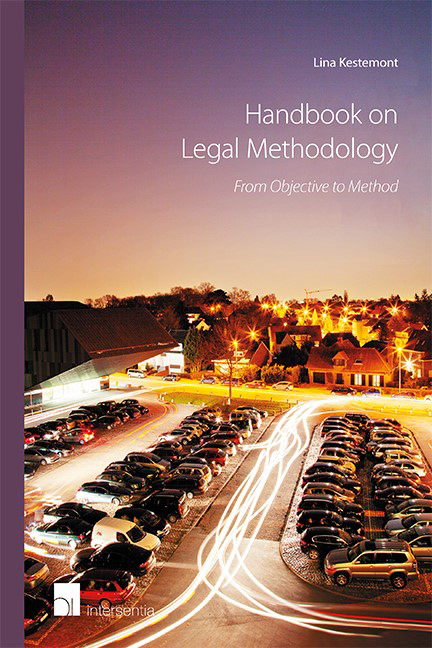Book contents
4 - Research objectives and overall methodological features
Published online by Cambridge University Press: 22 February 2022
Summary
Part 3 of this handbook describes how every type of research objective calls for its own specific methodological features. However, there are also some overall methodological features which are applicable to all research objectives. In the following we will discuss the importance of dissent, the possibility of interactions between different types of research objectives and the researcher's frame of reference.
ATTENTION FOR DISSENT
When discussing the methodological features of the theory-building and the recommendatory research objective, the importance of dissent was clearly mentioned: legal scholars cannot only refer to legal documents, case law or authors who support their theory or recommendation. It was argued that this kind of unilateral approach (focused on persuasion) is unacceptable for legal scholarship.
The attention for dissent, however, applies to all research objectives. When pursuing any research objective it is important for legal scholars to occasionally step away from their own way of thinking and to look for dissenting opinions, counter-arguments or conflicting interests. Instead of trying to hide dissent, legal scholars should embrace and address it: do other authors have a different opinion, why do they have a different opinion, why do we not share that opinion, etc.? Moreover, by explicitly dealing with counter-arguments and dissenting opinions legal scholars can strengthen their own arguments and mark their own spot within the academic community and its ongoing debate.
INTERACTION BETWEEN DIFFERENT RESEARCH OBJECTIVES – RESEARCH ISLANDS
Part 3 of this handbook has shown that every type of research objective has its own purpose and methodological features. However, during the research process these different types of objectives might closely interact with each other. The following passages were taken from the meta-study of our PhD project and they are concrete examples of how different types of research objectives can interact with each other. We refer in brackets to the research objectives involved.
Example 1:
“The systems involved in the comparison were studied (descriptive) and evaluated (evaluative) on equal terms.[…] In the end, the evaluations were brought into a comparative perspective (comparative) on the basis of which possible recommendations were formulated (recommendatory).”
- Type
- Chapter
- Information
- Handbook on Legal MethodologyFrom Objective to Method, pp. 75 - 82Publisher: IntersentiaPrint publication year: 2018



